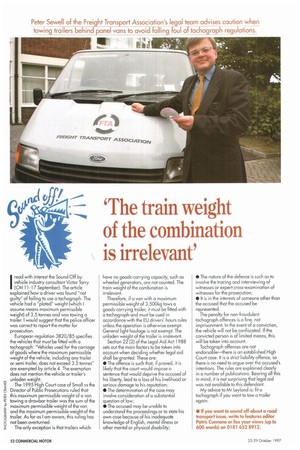Peter Sewell of the Freight Trans_Roo Association's legal team advises
Page 54

If you've noticed an error in this article please click here to report it so we can fix it.
caution when towing trailers behind panel vans to avoid falling foul of tachograph regulations.
The train weight of the combination is irrelevant'
Iread with interest the Sound Off by vehicle industry consultant Victor Tarry (CM 11-17 September). The article explained how a driver was found "not guilty" of failing to use a tachograph. The vehicle had a "plated" weight (which I assume means maximum permissible weight) of 3.5 tonnes and was towing a trailer. I would suggest that the police officer was correct to report the matter for prosecution.
European regulation 3820/85 specifies the vehicles that must be fitted with a tachograph: "Vehicles used for the carriage of goods where the maximum permissible weight of the vehicle, including any trailer or semi trailer, does not exceed 3.5 tonnes" are exempted by article 4. The exemption does not mention the vehicle or trailer's unladen weight.
'1? The 1 995 High Court case of Small vs the 6, Director of Public Prosecutions ruled that Le this maximum permissible weight of a van '2 towing a drawbar trailer was the sum of the
maximum permissible weight of the van ,
.7 and the maximum permissible weight of the 1 trailer. As far as I am aware, this ruling has 5 not been overturned.
The only exception is that trailers which have no goods-carrying capacity, such as wheeled generators, are not counted. The train weight of the combination is irrelevant.
Therefore, if a van with a maximum permissible weight of 3,500kg tows a goods-carrying trailer, it must be fitted with a tachograph and must be used in accordance with the EU drivers' hours rules unless the operation is otherwise exempt. General light haulage is not exempt. The unladen weight of the trailer is irrelevant. Section 22 (2) of the Legal Aid Act 1988 sets out the main factors to be taken into account when deciding whether legal aid shall be granted. These are: • The offence is such that if proved, it is likely that the court would impose a sentence that would deprive the accused of his liberty, lead to a loss of his livelihood or serious damage to his reputation; • The determination of the case may involve consideration of a substantial question of law; • The accused may be unable to understand the proceedings or to state his own case because of his inadequate knowledge of English, mental illness or other mental or physical disability; • The nature of the defence is such as to involve the tracing and interviewing of witnesses or expert cross-examination of witnesses for the prosecution; • It is in the interests of someone other than the accused that the accused be represented. The penalty for non-fraudulent tachograph offences is a fine, not imprisonment. In the event of a conviction, the vehicle will not be confiscated. If the convicted person is of limited means, this will be taken into account.
Tachograph offences are not
endorsaole—there is an established High Court case. It is a strict liability offence, so there is no need to argue over the accused's intentions. The rules are explained clearly in a number of publications. searing all this in mind, it is not surprising that legal aid was not available to this defendant. My advice to Mr Leyland is: fit a tachograph if you want to tow a trailer again.
• If you want to sound off about a road transport issue, write to features editor Patric Cunnane or fax your views (up to 600 words} on 0181 652 8912.
















































































































